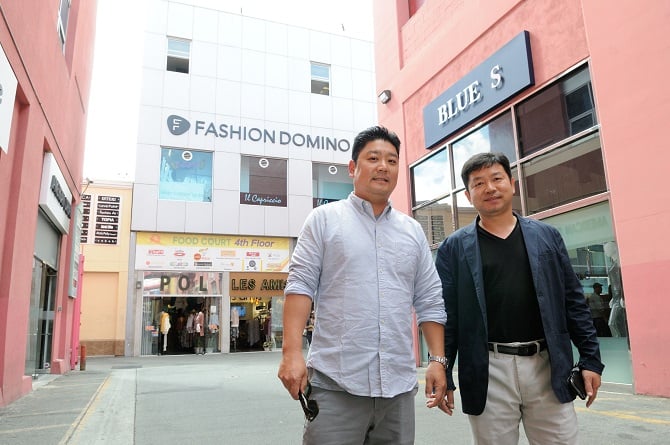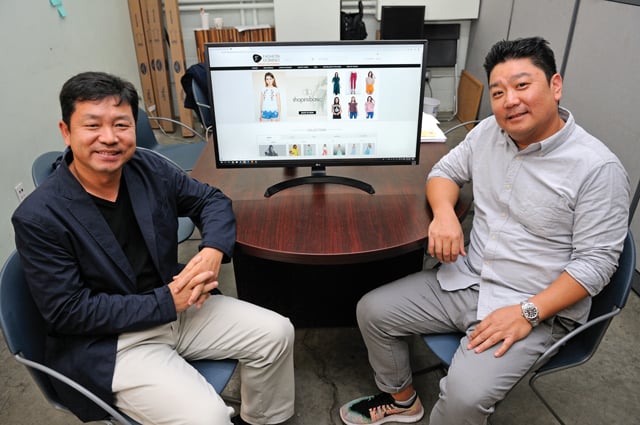A group of clothing manufacturers in downtown Los Angeles have banded together to launch Fashion Domino, a wholesale online platform in an effort to embrace e-commerce as traditional purchasing methods for apparel-makers change.

The 6-month-old website has raised $1 million in seed funding and counts more than 20 investors. About 130 vendors – who are required to have a business license and buy in wholesale quantities – have signed up for the service, according to Fashion Domino, which now counts nine employees.
All of the backers of the new company so far are members of the Korean-American Apparel Manufacturers Association, a trade group founded in the Fashion District in 1989. They say more and more storefronts, showrooms and tradeshows that have been long-standing staples of the wholesale apparel trade are seeing a decrease in foot traffic, causing a drop in sales for brands that don’t adjust.
Fashion Domino isn’t part of KAMA, according to Yul Kwon, a spokesman and consultant for Fashion Domino as well as a member of KAMA.
“We noticed a rising trend in wholesale B2B moving online,” Kwon said of the trade group’s members, who number at more than 1,000, according to its website. “(Fashion Domino) is the result of conversations we’ve been having among ourselves over the last two years about how to meet this industry need.”
The answer, Kwon said, was an e-commerce website that evened out the playing field for manufacturers.
Investors
Some of Fashion Domino’s investors include apparel business owners Peter Jung, of Kurve Inc., and Richard Jo, of Jostar. Apparel vendors include Doe & Rae, M. Rena Inc. and Paper Crane Wholesale, among others. The investor and vendor companies are all based in downtown Los Angeles.
Online business-to-business wholesale apparel sites aren’t new. Downtown-based LA Showroom and FashionGo are direct competitors to Fashion Domino. Both have existed for almost two decades, and FashionGo has offices across the street from Fashion Domino’s headquarters at 12th and San Pedro streets.
Fashion Domino hopes to stand out from its established competitors with more affordable services through the leveraging of KAMA’s network, Kwon said.
The target customer base for the company is retailers in the apparel business that have online and brick-and-mortar operations. Fashion Domino vendors need to have a business license in order to sign up on the e-commerce site, Kwon said. This is to ensure the weeding out of resellers.
“Resellers buy from manufacturers and sell at wholesale,” Kwon said. “For example, a reseller may purchase a basic T-shirt at $10 but sell for $20. Many times, the reseller sells more and makes more money.”
Members of KAMA get automatic access to the Fashion Domino site as part of their annual $450 membership fee. Non-KAMA members can join by paying $450 to Fashion Domino.
Kwon said the digital wave that’s changing the apparel trade at wholesale also has prompted concerns about what KAMA members see as high rates for membership and extra charges for ads to boost their product on wholesale sites, such as FashionGo.
“In order to sell your product on FashionGo, you need to advertise,” said Jung, who maintains status as a client of FashionGo alongside his investment in Fashion Domino.
He said he pays a monthly fee of $480 to FashionGo if he chooses not to advertise. He does advertise sometimes, and costs range from email blasts at $500 a day to banner ads can cost up to $5,000 a day.
FashionGo did not return calls for comment.
Fashion Domino will not charge for advertising or hosting services for the first 12 months of membership.
“You absolutely need to have an online presence in order to compete effectively as a wholesaler,” Kwon said. “But the cost of doing business on other sites was getting more and more expensive.”
Fashion Domino’s 130 vendors already are collectively offering more than 100,000 products on the e-commerce platform after six months in business.
Growth trend
The apparel trade is expected to grow globally for some time.
A recent report from Hamburg, Germany-based market research firm Statista projected the U.S. apparel market will reach $285 billion by 2025, up from $225 billion in 2012.
Because the market is fragmented, it is difficult to pinpoint how much wholesale apparel makes up of that pie. Another report from IbisWorld released last month narrows down the wholesale market for women and children’s apparel in the United States to a $79-billion sector.
Fashion Domino’s investors hope to capitalize on that market share by offering an option that has fairer pricing for apparel manufacturers, Jung said.
They claim the e-commerce site isn’t about profit, so much so that they’re capping percentage stake in the company.
“We don’t want one investor or company to have a majority stake,” Jung said.
The terms of investment at Fashion Domino caps at 4 percent. “For a 1 percent stake, the investment is $10,000,” Jung said.
The aim is to sign up around 300 to 500 vendors on the site over the next few months.
Kwon emphasized that the investors in the site are members of the LA Fashion District Business Improvement District, and the e-commerce effort was a collaborative one.
“We don’t expect to replace the Fashion District downtown, but we are faced with the pressures of e-commerce in the apparel sector,” he said. “We simply wanted one more option.”

